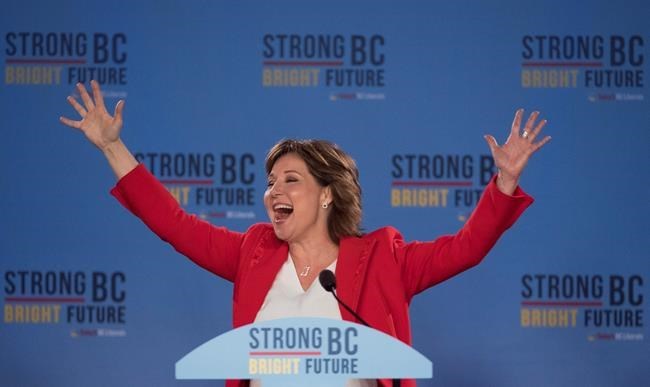
B.C. Liberal leader Christy Clark waves to the crowd following the B.C. Liberal election in Vancouver, B.C., Wednesday, May 10, 2017. THE CANADIAN PRESS/Jonathan Hayward
Republished May 10, 2017 - 12:51 AM
Original Publication Date May 09, 2017 - 1:01 AM
VANCOUVER - British Columbia has its first minority government in 65 years as the Liberals squeaked out a razor-thin victory over the NDP on Tuesday, with the Green party holding the balance of power for the first time in Canadian history.
Christy Clark's Liberals won 43 seats, the NDP under John Horgan got 41 and the Greens led by Andrew Weaver achieved a major breakthrough by picking up three seats.
The NDP won one riding by only nine votes, making a recount a certainty that will determine the difference between a minority and an ultra-thin majority if it were to flip to the Liberals.
Clark said she intends to lead the next government, adding the result presents an opportunity to open up a new dialogue "about how we do things, what we should do, how we want to shape the future of our province."
"Tonight is the beginning of something very different, and something that I think could be really exciting for the future of our province and our kids," she said.
She said her party won the popular vote, finishing with 40.9 per cent compared with the NDP's 39.9 per cent based on preliminary election results. Clark said she is confident that when absentee ballots are counted, they will strengthen the Liberals' margin of victory.
As the incumbent premier and with the most seats, Clark would be expected to get the first opportunity to form a minority government with the support of the Greens.
Horgan was not ready to concede defeat, however, saying that British Columbians have waited 16 years for a new government and will have to wait a bit longer until all the votes are counted.
"This is what we do know: a majority of British Columbians voted for a new government and I believe that's what they deserve," he said.
The campaign began four weeks ago with Clark and the Horgan locked in a tight race to be premier, and Weaver hoping to build upon his one seat in the legislature.
Weaver looked ecstatic as he addressed supporters in Victoria.
"What a historic day for British Columbia," he said. "People across British Columbia have shown that they are ready for politics to be done differently."
Weaver wasn't ready to tip his hand on whether he would support the Liberals or NDP in a minority government.
"In the days ahead there will be plenty of discussions taking place between all parties. Now is not the time for those discussions, now is the time for Greens across North America to celebrate," he told a cheering crowd.
Andrew Wilkinson, advanced education minister in Clark's government, said definitive results might not be available until the end of the month when absentee ballots and judicial recounts must be completed.
"It could be some time before this is completely clear."
The NDP focused its campaign on the seat-rich Lower Mainland. The party took several Liberal ridings in the city of Vancouver and won a handful of battleground ridings in the suburbs of Metro Vancouver, including seats in Surrey, Coquitlam and Delta.
The New Democrats also swept all four ridings in Burnaby, where the prospect of increased tanker traffic from the Trans Mountain pipeline expansion loomed large. Clark endorsed the project after the federal government's approval, but Horgan has promised to use "every tool in the toolbox" to stop it.
Several Liberal cabinet ministers lost seats in Metro Vancouver, including Attorney General Suzanne Anton, Technology Minister Amrik Virk and Peter Fassbender, the minister responsible for TransLink.
The party did well in rural and Interior B.C., where their pro-resource job message appeared to resonate.
The Liberals were trying to win a fifth successive majority government after holding power for 16 years.
Clark's campaign strategy marked a return to the Liberals' winning approach in 2013, when she promoted her party as the only one that could create and protect jobs while portraying the NDP as disastrous managers of the economy.
While Clark's promise of a booming liquefied natural gas industry has not materialized over the past four years, Clark was able to point to B.C.'s strong economy as proof of the Liberals' financial savvy. The province has Canada's lowest unemployment rate and has led the country in economic growth two years in a row.
Horgan sought to portray Clark as out of touch with regular British Columbians who feel the economy is not working for them, while Weaver cast the Greens as political outsiders.
The New Democrats' platform contained big-ticket promises including $10-a-day childcare, freezing hydro rates for a year and eliminating tolls on two major Lower Mainland bridges.
Weaver reminded voters that his party was the only one to ban corporate and union donations and his promises included electoral reform, increasing the carbon tax and investing millions in clean technology jobs.
B.C.'s campaign finance laws dominated headlines before the election began. The province allows unlimited corporate and union donations and the RCMP is investigating fundraising by the province's political parties.
After months of pressure, the Liberals committed to convening a panel to review political fundraising. The NDP and Greens have promised an outright ban on corporate and union donations.
— With files from Geordon Omand and Gemma Karstens-Smith in Vancouver, and Dirk Meissner in Victoria.
News from © The Canadian Press, 2017